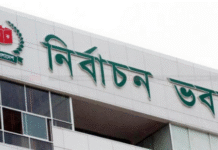Over 3.7 lakh litres of milk either wasted or sold at throwaway prices on a hartal day

Farmers dumping sour milk at Madarganj in Jamalpur yesterday, as dairy producers have stopped taking the risk of buying or transporting milk during hartal days. Collected milk stays good only for six hours.
At least 3.7 lakh litres of milk go sour or being sold at a throw-away price on every hartal day, as leading dairy producers Milk Vita and Brac have stopped buying and transporting milk fearing shutdown violence.
According to an estimate of Bangladesh Milk Producers’ Cooperative Union Ltd, that owns Milk Vita, at least 2 lakh dairy farmers with unsold milk and around 5,000 transporters without pay have to go through untold hardship during the politically troubled times.
This also affects at least a million consumers, including children, senior citizens and ailing people, who remain deprived of essential nutrition of milk, said the estimate.
Every day, farmers across the country sell around 2.5 lakh litres of milk to state-run cooperative dairy Milk Vita that markets pasteurised milk in greater Dhaka city, and Sylhet and Chittagong divisional cities.
However since Sunday, Milk Vita had to stop collecting milk at all its 32 chilling plants across the country in fear of losing expensive tankers in the ongoing countrywide hartal violence.
Mohammad Munir Chowdhury, managing director of Milk Vita, said hartal supporters had badly damaged four refrigerated lorries of Milk Vita since April this year. They no longer dare to take out the vehicles again, as pickets launch massive attacks on their vehicles considering those as government property.
The MD said more than a million people were directly or indirectly dependent on the cooperative milk production. They suffered when the production chain collapsed.
“Frequent hartals not only affect the dairy farmers and their families but have also caused Milk Vita a loss of Tk 98 crore in 49 hartal days so far this year,” said Munir Chowdhury, adding that during the period, the farmers and milk transporters (three-wheeler van drivers) had suffered an accumulated loss of Tk 1.5 crore.
Rakhal Ghosh, president of a milk cooperative society in Madarganj of Jamalpur, said they were forced to sell milk at less than half the production cost.
“On Sunday, we could sell 400 out of 600 litres of milk at Tk 15 a litre in the open market and had to dump the rest in the river,” he said, adding that they could not even take the milk to distant markets due to the hartal.
Abuds Samad Fakir, president of Reshambari Cooperative Society of Milk Vita in Baghabarighat, said hardship due to supply chain collapse eats up their investment if a hartal continues for two to three days.
Dairy farmers in Bhangura, Natore, Panchagarh, Mohanpur, Bogra, Ishwardi, Naogaon and Rangpur are suffering more, as Milk Vita’s Baghabari chilling plant for the region can daily turn only one lakh litre of milk into powder.
A Milk Vita official said raw milk starts going sour after six hours after the collections and the farmers cannot afford to stop milking their cows as it would otherwise cause lactating animals a disease called Mastitis.
In April, the Milk Vita authorities had urged all political parties and officially requested the opposition leader in May to spare milk-carrying vehicles considering the goods as baby food and diet for patients, but to no avail.
Md Mosleh Uddin, general manager of Brac Dairy, a leading entrepreneur in the country’s dairy sector, said they collect 1.2 lakh litres of milk from 46,000 farmers every day at 101 chilling plants across the country.
“We are suffering from serious loss and damage due to frequent hartals. It is cutting down half the milk collection,” he said, adding, “We take great risk of transporting milk during night to pasteurise it at our Gazipur factory.”
He said that on Monday night they had sent 10 empty tankers from Dhaka to Shahjadpur to bring milk, but six of the vehicles came under attack on the highway around 1:30am.
Mokhlesur Rahman, driver of one of the tankers, sustained injury in the right eye as attackers smashed the windshield of the vehicle, said Mosleh Uddin. He finally lost the vision of the injured eye.
Mosleh Uddin said the attackers even blocked the highways felling trees and robbed the drivers in the name of hartal.
BRAC Dairy has 101 collection and chilling stations in 25 districts. Ten of them are located in ultra-poor areas.
The enterprise serves 46,000 farmers, 64% of whom are women. It has 23 distributors and 37 sales centres nationwide, covering 16,000 outlets and enjoying an overall market share of 22% with a dedicated consumer base of around 500,000.
Source: The Daily Star









